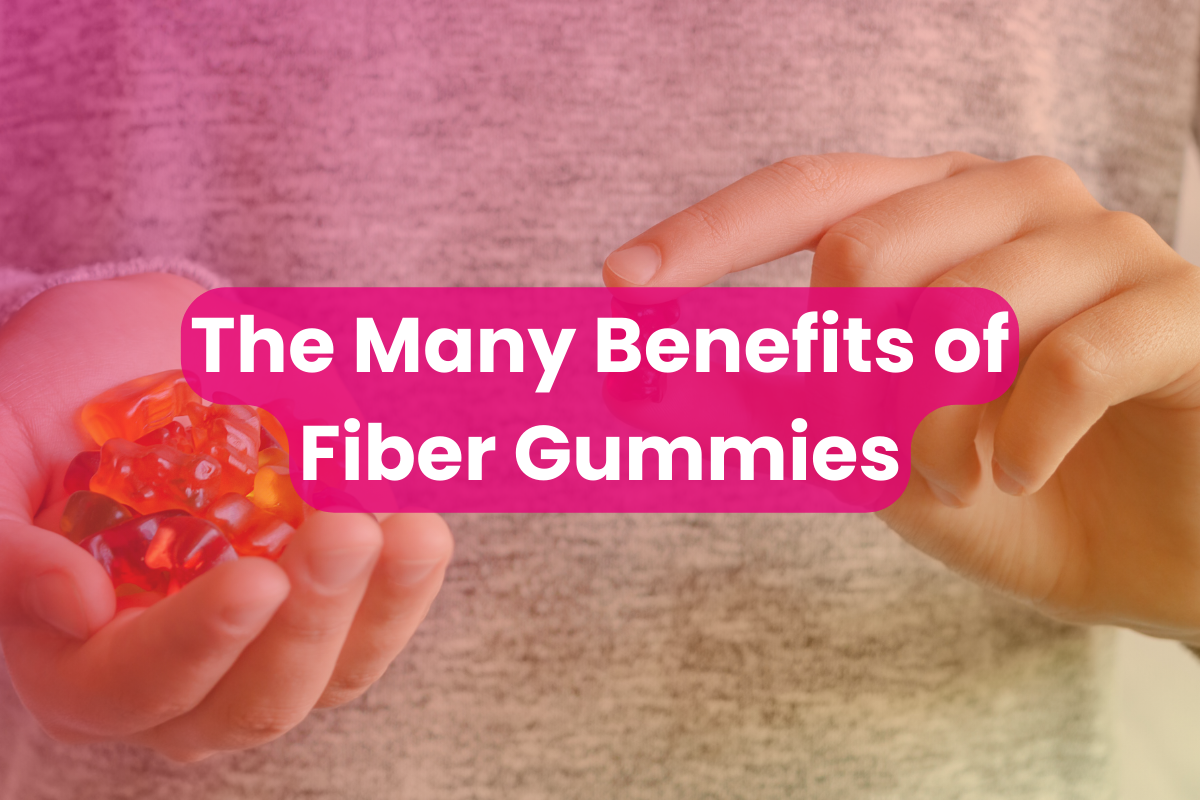
The stats are alarming—a mere 5% of the US population eats enough fiber every day.
According to the USDA dietary guidelines, women under 50 should aim to consume 25-28 grams of fiber daily, and men in the same age range, should be consuming 28-31 grams a day.
If you are not hitting your daily target, you may be wondering if taking fiber gummies is the easiest way to bridge that intake gap?
Read on to learn more about the benefits of fiber gummies, the potential side effects, and the overall efficacy of the supplement treatment.
What Are Fiber Gummies?
Fiber supplements come in many shapes and forms—powders, capsules, crackers, and gummies. People tend to choose gummies over traditional powders and capsules because they taste better and are more convenient.
However, the core ingredient is mostly the same across all supplement forms. They’re all made with soluble complex carbohydrates, either natural or synthetic. Gummies just contain more sugars (or artificial sweeteners) than the capsules.
The most common plant-based fibers used in supplements are inulin, psyllium, and wheat dextrin. Other brands use polydextrose (PDX) and lab-made fructooligosaccharides (FOS).
That said, the fiber here is usually isolated, meaning it doesn’t come with the other nutrients that you’d find in the whole food. That’s why if you look at the label, you likely won’t find any information about protein, minerals, or fatty acids.
Some manufacturers add vitamins or probiotics to their fiber gummies, though. This would make the product a 2-in-1 supplement.
What Are the Benefits of Fiber Gummies?
Generally speaking, dietary supplements aren’t subject to the same level of testing as drugs. So, there isn’t much clinical research to back up the claims that manufacturers make. Gummies, in particular, are hard to formulate consistently.
However, we do know that fiber is good because it:
Protects your heart from high cholesterol. Soluble fibers form a viscous substance that “traps” the cholesterol in your intestines and reduces its reabsorption.
Helps control your blood sugar levels. Despite being a carbohydrate, the fiber isn’t broken down into sugars. It also slows the digestion and absorption of simpler sugars, reducing spikes.
Fills you up. A bit of fiber with your meals can keep you feeling full longer.
Feeds probiotics that can restore your flora. Even if your fiber gummies don’t have any added probiotics, they can still act as a prebiotic (food for the “good” bacteria in your gut).
Helps you maintain healthy bowel movements. Consuming different types of fibers (soluble and insoluble) can keep your movements regular.
Reduces cancer mortality risk. A meta-analysis shows that fiber intake can reduce mortality from cancer and cardiovascular diseases.
Prevents diverticulitis. Although patients with acute diverticulitis should avoid fiber, a high-fiber diet might prevent the inflammation from the get-go.
What Are the Side Effects of Fiber Gummies?
The number one issue to expect is gas, but it’s often temporary and can be avoided.
Side effects usually happen when people suddenly add a lot of fiber to their diets. Their digestive systems can’t process all that fiber, which can cause gas and bloating. That’s why it’s recommended to increase the dosage gradually.
Another concern is drug interactions.
Because fiber supplements slow digestion, they might interfere with the absorption of some medications. Your physician might recommend taking the gummies and the medication at different times or stopping the supplements altogether.
What Do Fiber Gummies Help With?
Insoluble fiber is bad for people with diarrhea-predominant IBS.
Yet, the soluble form of fiber in supplements can reportedly help with the usual symptoms of IBS, whether it’s primarily diarrhea or constipation. Psyllium is often a good choice. You’d need to increase your water intake, though.
Plus, since fiber boosts overall gut health and microbiota, it can help with chronic inflammation.
And as we’ve covered earlier, fiber can help with overeating because it fills your stomach. Glucomannan is particularly vicious. So, you can look for gummies infused with this fiber if you need to boost your weight loss strategies.
People Also Ask
Do fiber gummies help you poop?
Yes, soluble fiber (like psyllium, inulin, and wheat dextrin) absorbs water, forming a gel-like substance. This viscous substance then helps stool pass smoothly. Meanwhile, insoluble fiber can bulk the stool and get everything moving.
On the other hand, fiber can worsen constipation if the condition isn’t caused by insufficient fiber intake in the first place. Sometimes, holding back the fiber can be beneficial for people with chronic idiopathic constipation.
How effective are fiber gummies?
Fiber gummies aren’t effective enough to replace the fiber found in a balanced diet.
The best way to go is to try and get enough soluble and insoluble fibers from real food. Canned beans, oats, carrots, broccoli, and chia seeds are all good sources to consider.
And if you’re one of the people who can’t get enough fiber naturally, the gummies should fill in the gap between the recommended amounts and your actual intake.
Bottom line
Fiber gummies are an effective way to increase your fiber intake. Although it is not as effective as fiber from a balanced diet, fiber gummies can provide you with the essential nutrients normally gained from fiber, such as fighting inflammation and helping stool move through your body smoothly.
One important drawback of using fiber gummies, is that gummies generally contain more sugar than alternative method of consuming fiber. So before deciding on a fiber gummy supplement, it is important to view the nutrition facts to ensure you are okay with the nutritional make up of the supplements.





Comments (0)
Back to Learn